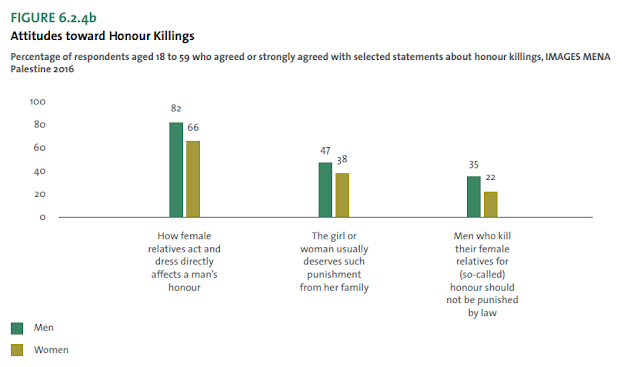An NGO called IMAGES surveyed people in Egypt, Lebanon, Morocco and the Palestinian Authority. Here are their results on the questions of family honor and honor killings:
35% of Palestinian men say that men who kill their female relatives for "honor" reasons should not go to jail. That is a higher percentage than any other group surveyed.
Worse, 47% of Palestinian men say that female relatives who "act or dress" in ways that they disapprove deserve to be punished. (62% of Egyptian men believe that.)
The survey, called the International Men and Gender Equality Survey (Images), was carried out in the territories by a group at Bir Zeit University, and as a result it downplays the misogynist violence and attitudes to be the result of "occupation." This bias includes a section of interviews with former long-term prisoners, who are a tiny percentage of Palestinian men, about how well well they respect their wives for taking care of their families while they were incarcerated. The Palestinian part of the survey goes to great lengths to blame Israel, with the entire section introduced with "The reality of Palestinian lives – including gender relations and gender dynamics – has been carved by the prolonged Israeli occupation. The occupation has become the central structural framework of analysis for all elements of political, economic, and social life in Palestine. IMAGES findings in Palestine must be understood within this contextual framework."
In other words, even this survey is being twisted to Palestinian political desire to place the "occupation" as the central problem in the Middle East. As a result, findings like the tolerance for honor killings is downplayed and the more progressive findings are trumpeted. Paragraphs like these, with no scientific basis, are sprinkled throughout:
This leaves the pursuit of gender justice objectives in Palestine in a unique place: byHere is where social science is subverted by politics.
many indicators, quality of life seems to be deteriorating for the majority of Palestinians,
patriarchal structures and gendered expectations persist, and the occupation goes on
seemingly indefinitely. At the same time, partly in spite of and partly because of these
factors, many Palestinian women and men find themselves in truly transformed gendered
spaces. This study has sought to better document these overlapping dynamics and this
moment in the rich story of gender in Palestinian life.
So you have to dig to find out that about one fifth of Palestinian husbands beat their wives, 34% of men believe that there are times that a woman deserves to be beaten, and 67% say women are too emotional to be leaders. These are blamed on high unemployment by men, which are the fault of Israel (and the PA):
These realities are a result of the prolonged occupation’s structural domination of Palestinian lives and the Palestinian economy, as well as the Palestinian Authority’s neo-liberal policies that impoverish the majority of Palestinians. The depressive symptoms, in this case, can be understood as an expression of the failure of society to provide the conditions under which men can fulfil their socially-assigned role as breadwinners.Yes, a survey on gender equality is so subverted by anti-Israel politics that it accepts the idea of men alone as breadwinners to justify their violence and misogynist attitudes towards women.

 Elder of Ziyon
Elder of Ziyon

























